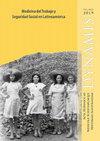Gifted Parents: The impact of giftedness on parenting cultures in the United States, 1920 – 1960
IF 0.1
4区 哲学
Q3 HISTORY & PHILOSOPHY OF SCIENCE
引用次数: 0
Abstract
This paper explores how discourses of giftedness informed attitudes towards parenting in the United States from 1920 to 1960. Using psychologists’ studies of giftedness, media coverage of the topic, and guidebooks for parents of gifted children, I argue that giftedness emerged in the 1910s, and by the 1920s addressed a newly limited definition of intelligence and problems in urban public education, coinciding with the popularity of the culture and personality school. Scholarly debates about giftedness traveled from the academy to the wider public through the media and guidebooks for parents. Media coverage brought awareness of the problem of the neglected gifted student, and guidebooks offered parents practical suggestions about how to raise gifted children. I show that the discourse contributed to racial segregation in American schools and classrooms by using merit to determine access to educa- tional opportunity. Experts’ advice about giftedness also altered expectations about childrearing and encouraged parents to become more involved in their child’s educational development. This argument puts the history of psychology in conversation with histories of parenting, and it evidences how the discourse on giftedness impacted institutional inequality both through merit-based gifted and talented programs and by impacting ideologies of parenting. Thus, I provide a more comprehensive account of how and why giftedness profoundly shaped both the school and the home. This article considers the cultural work the discourse accomplished; it gave the public the impression that disparities in educational achievement between individuals and groups could be explained by the parenting a child received, putting significant pressure on all parents to make educational achievement a top priority for their child.天才父母:天才对1920 - 1960年美国教养文化的影响
本文探讨了天赋的话语如何影响1920年至1960年美国人对养育子女的态度。根据心理学家对天才的研究,媒体对这个话题的报道,以及天才儿童父母的指导手册,我认为天才出现在20世纪10年代,到20世纪20年代,与文化和个性学校的流行相一致,天才提出了一个新的有限的智力定义和城市公共教育中的问题。关于天赋的学术辩论通过媒体和家长指南从学术界传播到更广泛的公众。媒体的报道使人们意识到被忽视的天才学生的问题,而指导手册则为家长提供了如何培养天才儿童的实用建议。我表明,这种论述通过用成绩来决定获得教育机会的机会,助长了美国学校和教室中的种族隔离。专家关于天赋的建议也改变了人们对孩子的期望,并鼓励父母更多地参与孩子的教育发展。这一论点将心理学的历史与育儿的历史进行了对话,它证明了关于天赋的论述是如何通过以成绩为基础的天才和天才项目以及影响育儿的意识形态来影响制度上的不平等的。因此,我提供了一个更全面的描述,说明天赋如何以及为什么深刻地影响了学校和家庭。本文考察了话语所完成的文化工作;它给公众的印象是,个人和群体之间教育成就的差异可以用孩子所受到的教育来解释,这给所有父母带来了巨大的压力,让他们把孩子的教育成就放在首位。
本文章由计算机程序翻译,如有差异,请以英文原文为准。
求助全文
约1分钟内获得全文
求助全文
来源期刊

Dynamis
社会科学-科学史与科学哲学
CiteScore
0.30
自引率
0.00%
发文量
0
审稿时长
>12 weeks
期刊介绍:
DYNAMIS is an international journal devoted to the history of medicine, health and science, founded in 1981, that pays special attention to novel and interdisciplinary historiographic perspectives. It offers original, double peer-reviewed research studies (articles, notes or documents) and reviews in languages of the European Union.
 求助内容:
求助内容: 应助结果提醒方式:
应助结果提醒方式:


